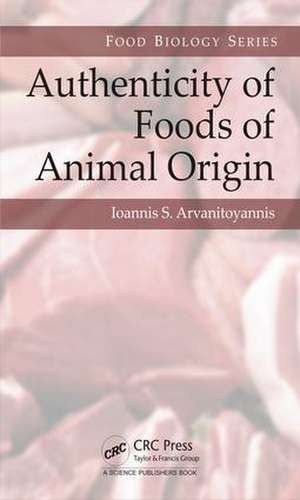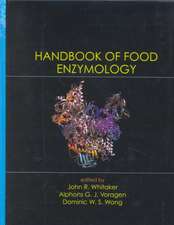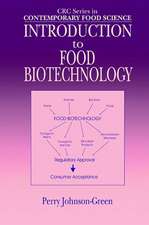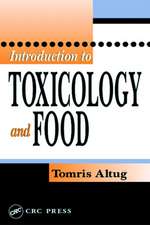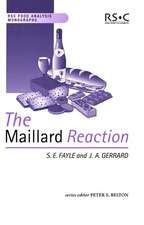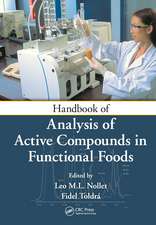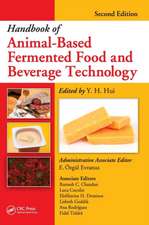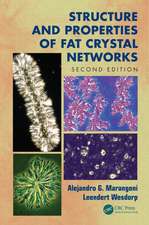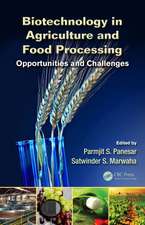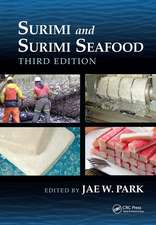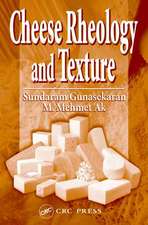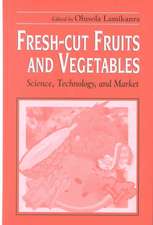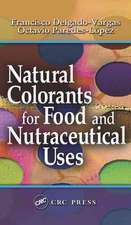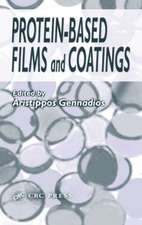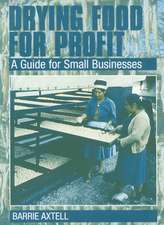Authenticity of Foods of Animal Origin: Food Biology Series
Autor Ioannis Sotirios Arvanitoyannisen Limba Engleză Hardback – 18 dec 2015
The best policy to solve a crisis is to recall affected products. However, an effective and rapid recall presupposes the proper functioning of traceability. The latter is a prerequisite of current legislation (Regulation 178/2002). Traceability can be based either on EAN (European Article Number) -8,-9, -12, -13 and -128 or RF-ID (Radio Frequency Identification). Although the usage of RF-ID is more expensive than that of EAN, it is preferred in the case of animals and fish. Once the animal has been cut to pieces, all the previous information stored in the RF-ID can be passed to EAN-128.
This book aims at addressing five major issues: food traceability; food authenticity techniques and methods to detect potential adulteration; application of authenticity techniques and methods to foods of animal origin; legislation regarding traceability and authenticity in EU, USA, Canada, Japan, and Australia-NZ; and trends and suggestions for further research in food traceability and authenticity. A second book, entitled Authenticity of foods of plant origin and genetically modified organisms, will follow this book. This book is expected to be useful to academicians, industrialists, students of food science and technology, veterinarians, and technicians specialized in food technology.
| Toate formatele și edițiile | Preț | Express |
|---|---|---|
| Paperback (1) | 322.40 lei 6-8 săpt. | |
| CRC Press – 18 dec 2020 | 322.40 lei 6-8 săpt. | |
| Hardback (1) | 882.08 lei 6-8 săpt. | |
| CRC Press – 18 dec 2015 | 882.08 lei 6-8 săpt. |
Din seria Food Biology Series
- 28%
 Preț: 371.12 lei
Preț: 371.12 lei - 13%
 Preț: 322.40 lei
Preț: 322.40 lei - 12%
 Preț: 315.26 lei
Preț: 315.26 lei - 27%
 Preț: 1049.50 lei
Preț: 1049.50 lei -
 Preț: 450.79 lei
Preț: 450.79 lei - 13%
 Preț: 318.59 lei
Preț: 318.59 lei - 11%
 Preț: 319.07 lei
Preț: 319.07 lei - 12%
 Preț: 315.00 lei
Preț: 315.00 lei - 15%
 Preț: 489.26 lei
Preț: 489.26 lei - 12%
 Preț: 339.73 lei
Preț: 339.73 lei -
 Preț: 493.12 lei
Preț: 493.12 lei - 12%
 Preț: 312.43 lei
Preț: 312.43 lei - 14%
 Preț: 312.43 lei
Preț: 312.43 lei - 14%
 Preț: 314.41 lei
Preț: 314.41 lei - 12%
 Preț: 326.63 lei
Preț: 326.63 lei - 13%
 Preț: 319.07 lei
Preț: 319.07 lei - 15%
 Preț: 452.95 lei
Preț: 452.95 lei - 8%
 Preț: 390.87 lei
Preț: 390.87 lei - 18%
 Preț: 1389.36 lei
Preț: 1389.36 lei - 15%
 Preț: 699.58 lei
Preț: 699.58 lei - 25%
 Preț: 370.39 lei
Preț: 370.39 lei
Preț: 882.08 lei
Preț vechi: 1219.66 lei
-28% Nou
Puncte Express: 1323
Preț estimativ în valută:
168.81€ • 175.59$ • 139.36£
168.81€ • 175.59$ • 139.36£
Carte tipărită la comandă
Livrare economică 14-28 aprilie
Preluare comenzi: 021 569.72.76
Specificații
ISBN-13: 9781498706414
ISBN-10: 149870641X
Pagini: 334
Ilustrații: 3 black & white illustrations
Dimensiuni: 156 x 234 x 33 mm
Greutate: 0.82 kg
Ediția:1
Editura: CRC Press
Colecția CRC Press
Seria Food Biology Series
Locul publicării:Boca Raton, United States
ISBN-10: 149870641X
Pagini: 334
Ilustrații: 3 black & white illustrations
Dimensiuni: 156 x 234 x 33 mm
Greutate: 0.82 kg
Ediția:1
Editura: CRC Press
Colecția CRC Press
Seria Food Biology Series
Locul publicării:Boca Raton, United States
Cuprins
Preface. Part A – Introduction In Authenticity and Traceability of Foods. Part B – Authenticity of Foods of Animal Origin. Part C – Legislation for Traceability and Authenticity of Foods. Part D – Conclusions, Future Trends and Suggestions. Index.
Notă biografică
Ioannis Sotirios Arvanitoyannis
Descriere
The first in a two-volume set on the authenticity of foods, this volume focuses on techniques and methods for assessing food authenticity and traceability and their application to foods of animal origin. Dedicated chapters include meats, poultry, fish and seafood, milk and dairy, and honey. The book addresses current legislation in the United States, Canada, and Europe regarding traceability, authenticity, and the genetic modification of foods. The final section offers conclusions, discusses future trends, and provides suggestions for improving food authenticity and traceability.
